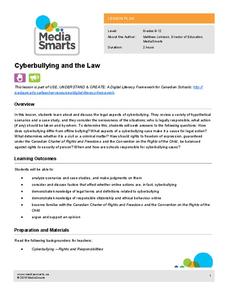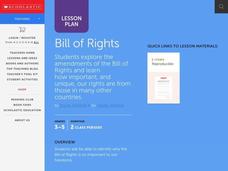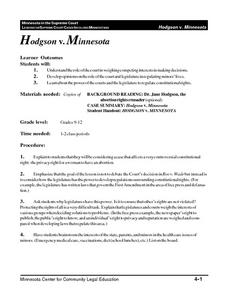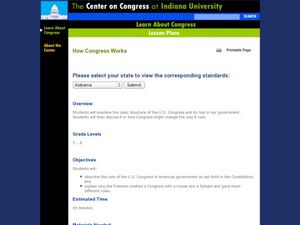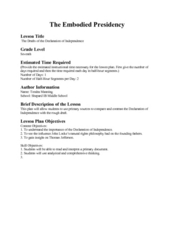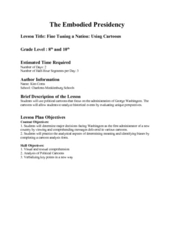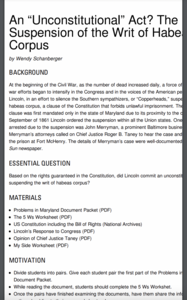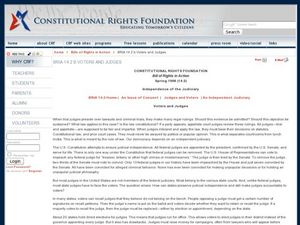Center for History and New Media
A Look at Virginians During Reconstruction, 1865-1877
The transition between rebellion to reunification was not smooth after the Civil War. Young historians compare primary and secondary source documents in a study of the Reconstruction era in Virginia, noting the rights that were not...
PBS
The History of Book Banning in America
Harry Potter, Are You There God? It's Me, Margaret, To Kill a Mockingbird. Kids view a slide show and then discuss the seven banned books featured in the presentation and the reasons why the books may have been banned.
Roy Rosenzweig Center for History and New Media
Founding Documents
Teach the class about the predecessor to Declaration of Independence—the Virginia Declaration of Rights. Using the foundational documents, scholars examine the two writings to consider how they are similar and how they are different. A...
Curated OER
The Civil War
Although we currently focus on Abraham Lincoln's positive contributions in creating a more equal society, the truth is that Lincoln was actually a controversial character in his time! After studying the Civil War, give your high...
Media Smarts
Cyberbullying and the Law
Research, role-playing, and reflection are the three “R’s” that form the basis of an examination of Cyberbullying. Although based on the Criminal Code of Canada, the included scenarios and case studies provide valuable resources for a...
Judicial Learning Center
Rule of Law WebQuest
Go on a WebQuest to find the Rule of Law! Scholars use the Internet to learn all about how law works in a democracy and how the Rule of Law relates to both American government and governments around the world. Researchers then engage in...
K20 LEARN
Ancient Philosophy: Greeks or Romans?
While often not recognized, the ideas of ancient Greek and Roman philosophers still echo today. Using a series of videos and graphic organizers, individuals explore how ancient Greeks and Romans have influenced current Western political...
Newseum
Battle for the Bill of Rights: Ultimate Survivor Amendment Game
To understand the importance of the wording of the articles of the First Amendment (freedom of religion, freedom of speech and the press, and freedom to assembly and petition), teams argue before a jury for draft amendments of one...
Curated OER
Bill of Rights
Students discuss the government as a whole and then each amendment is examined. They complete a Bill of Rights test in groups or on their own. Answers are gone over in class and discussion is encouraged.
Curated OER
Searching for Answers
How does a judge in the federal judicial court decide on a verdict? Give your middle and high schoolers a better idea of how final decisions are made in the judicial system. Then split your class into four groups, assigning each group a...
Curated OER
Legislative Branch
Students analyze Article 1 of the Constitution. They respond to the Public Criticism E-Learning module.
Curated OER
In Congress Assembled: Continuity and Change in the Governing of the United States
Students interpret history using primary resources and secondary research. The Constitution is examined and changes are explained within the time period they were made.
Curated OER
Hodgson v. Minnesota
Students investigate the role of and develop opinions of the court in weighing competing interests in making decisions. They examine the power of the courts and legislature to regulate constitutional rights.
Curated OER
Preserving Democracy
Students read excerpts of the Declaration of Independence and United States Constitution. Using the documents, they identify the ideas of how the government should be run. In groups, they develop a skit that encourages people to be...
Curated OER
How Congress Works
Students describe role of the U.S. Congress in American government as set forth in the Constitution, and explain why the Framers created a Congress with a House and a Senate and gave them different roles.
Curated OER
Homemade Political Parties
Use this 5-day lesson to clarify the platforms of the two major parties, comparing and contrasting against students' beliefs. Begin by looking at unlabeled summaries of both party platforms, having learners identify most with one. Groups...
Curated OER
Judicial Review
Students review the concepts they were introduced to in a telecast on judicial review. After reading an article, they answer discussion questions and repeat the same procedure for another article. They participate in a debriefing session...
Curated OER
The Drafts of the Declaration of Independence
Seventh graders compare drafts of the Declaration of Independence. In this primary source analysis lesson plan, 7th graders access copies of Thomas Jefferson's original draft of the document and compare it the final document that gave...
Curated OER
Fine Tuning a Nation: Using Cartoons
Students examine political cartoons to gain an understanding of the political issues that George Washington faced. In this historical perspectives lesson, students analyze political cartoons about the National Bank, the title presidents,...
Curated OER
An "Unconstitutional" Act? The Suspension of the Writ of Habeas Corpus
Students explore the implications of habeas corpus. In this Civil War instructional activity, students analyze the writ of habeas corpus by Lincoln during the war. Students examine primary sources from Lincoln and Chief Justice Taney....
Curated OER
Teaching Controversial Science Issues Through Law Related Education
A set of lessons help aspiring scientists practice the critical thinking skills required for facing controversial issues such as evolution. As a group, they discuss what controversy consists of. They compare and constrast the concepts of...
Curated OER
In the Courts
Students explore desegregation in the courts. In this civil rights lesson, students listen to their instructor present a lecture on Supreme Court cases Brown v. Board of Education and Plessy v. Ferguson. Students examine the...
Curated OER
Should Homosexuals Have the Right to Laws Protecting Them From Discrimination?
Students explore discrimination issues in America. In this homosexual rights lesson, students listen to their instructor lecture on antidiscrimination laws and gay rights. Students respond to questions about the Romer v. Evans case.
Curated OER
Voters and Judges
Students analyze the work on independent judiciaries. In this federal courts lesson, students listen to their instructor lecture on details of federal cases. Students respond to discussion questions and participate in an activity...
Other popular searches
- Us Constitution Lessons
- Texas Constitution Lessons
- Constitution Lessons Grade 3
- U S Constitution Lessons
- U.s Constitution Lessons
- The Constitution Lessons






